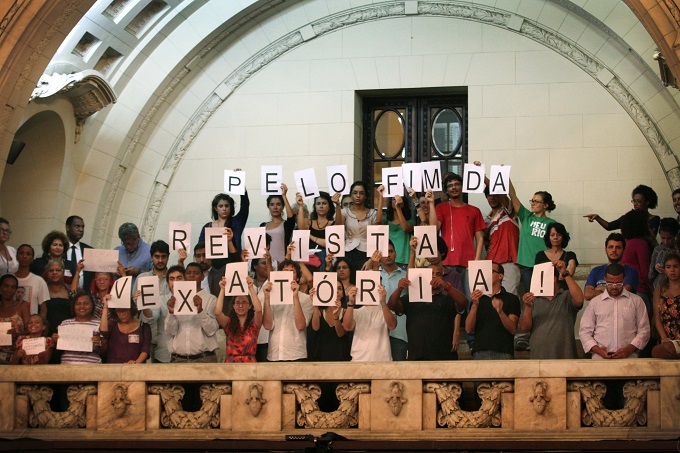All up to the governor
 Civil society participated in force at the state legislature this Tuesday
Civil society participated in force at the state legislature this Tuesday
The state of Rio de Janeiro has taken an important step towards banning abusive body searches in its prisons. This Tuesday, March 10, the Rio de Janeiro State Legislature (ALERJ) approved, by 45 votes to two, Bill 77/2015 that was drafted by legislators Marcelo Freixo, Jorge Picciani and André Ceciliano.
The bill will now be sent to the state governor, Luiz Fernando Pezão, who has two weeks to sign or veto the law.
The text of the bill establishes that prisons are banned from subjecting visitors to invasive procedures, such as undressing, squatting repeatedly over a mirror, and anal and vaginal inspections. It also determines that other search methods be used, such as metal detectors and body scanners, or that the prisoners instead are searched after the visit.
“The approval in Rio de Janeiro was a major step forward. The resounding vote in favor of the bill illustrates that the legislature understands that the abusive search is a humiliating practice that extends the offender’s punishment to their relatives,” said Vivian Calderoni, a lawyer at Conectas.
Rio de Janeiro already has a resolution (330), published in November 2009 by the State Prison Administration Department, that places restrictions on abusive body searches and determines, for example, the use of electronic means to perform the inspections. The state’s prisons, however, have not been complying with the resolution.
“We hope that with the approval of the law, the ban will gain more traction and be respected by prisons,” added Calderoni.
Bill 77/15, however, does not include detention centers for young offenders. But another proposal (Bill 76/2015), also drafted by Freixo and Picciani, bans the procedure on people who visit adolescents serving sentences in these facilities, and it is currently pending in ALERJ.
Federal Bill
On the national level, after passing in the Senate in June 2014, the Lower House Commission on Human Rights and Minorities unanimously approved Bill 7764/2014 in November that bans abusive searches from being performed in all Brazilian prisons. The text now proceeds to two other commissions: the Public Security Commission and the Constitution and Justice Commission, before being signed into law by the president.
“The members of Congress should follow the example set by the Rio de Janeiro and São Paulo state lawmakers, who have done their part,” said Rafael Custódio, coordinator of the Justice program at Conectas. “Although it is important for the states to mobilize to put a stop to the practice, it is crucial for the federal law to be passed, since this will allow for standardization of procedures across the country,” he added.
The abusive search is considered “mistreatment” by the United Nations and, depending on the circumstances, may constitute torture. Although it is already expressly banned in many countries and the State of Argentina was condemned by the Inter-American Commission on Human Rights of the Organization of American States (OAS) in 1996 for this very reason, Brazil continues to perform these searches.


